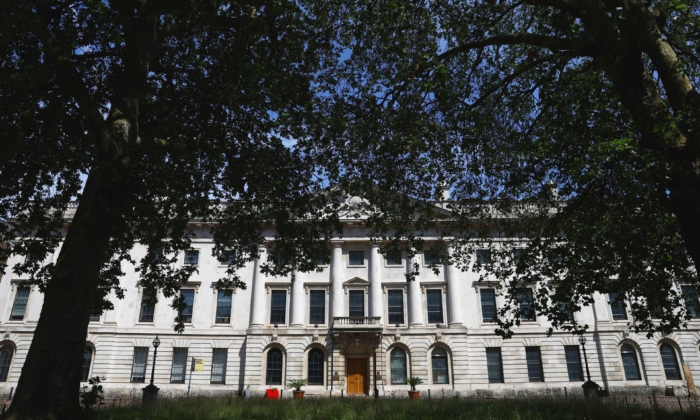London Council Denies China’s New Embassy Proposal for the Second Time
The Tower Hamlets council unanimously voted to reject the Chinese embassy’s planning permission; the final decision will be made by Westminster next year.
London’s Tower Hamlets council turned down Beijing’s proposal for a new embassy a second time, increasing pressure on Westminster to refuse the application.
On Monday, local councilors on the borough’s Strategic Development Committee voted unanimously against the planning application, expressing concerns about issues related to protests such as traffic congestion, impact on local tourism, and policing.
In 2022, the council rejected a similar plan to convert the Royal Mint Court site near Tower Bridge into the largest Chinese embassy in Europe. However, the final decision on the new application rests with the UK central government after Beijing’s request.
The Chinese government purchased the site in 2018 for 255 million pounds ($326 million) to build a roughly 700,000-square-foot embassy, substantially larger than its current embassy in London and the one in Washington.
The proposed complex would include a main embassy building, a visa center, a “cultural exchange building,” and 225 flats for embassy staff and visitors on the vacant site since 2013.
Before the vote on Monday, the council received 246 submissions supporting the application and 273 objections, including local signatures collected through a campaign and two petitions.
The Metropolitan Police Chief Inspector David Hodges voiced objections to the planning application, citing “unique challenges” the force is not equipped to handle effectively.
Hodges highlighted that the site’s location at a major junction could significantly impact the local area, London, a nearby hospital, and residential neighborhoods in case of demonstrations.
He expressed concerns about potential disruptions to traffic if protests spill onto the streets, emphasizing that Tower Hamlets’ policing model lacks the capability to manage such challenges compared to other areas hosting diplomatic missions.
An earlier submission from the Met reported 47 protests outside the current embassy in 2023 and 2024, with many events drawing more than 100 participants.
Previous Rejection
Councilors had previously rejected the plan in December 2022 despite planners’ recommendation to approve it, citing concerns about resident and tourist safety, heritage, police resources, and the congested nature of the area.
The rejection followed various protests and incidents involving Chinese diplomatic sites, raising local concerns.
Hongkongers rallying outside the Chinese Consulate in Manchester were subject to attacks, including one individual being dragged into the consulate and assaulted by staff on Oct. 16, 2022.
During the consultation, objecting locals expressed worries about the embassy’s impact on heritage sites and communities, with concerns that the large compound could potentially operate as a “secret police station.”
After missing the appeal deadline in 2023 and blaming the Conservative government for not intervening, the Chinese embassy submitted a new bid for the plan in July, shortly after the Labor Party assumed power, arguing against the council’s previous rejection.
On Oct. 14, the government requested planning permission on behalf of Deputy Prime Minister and Housing Secretary Angela Rayner, who has authority in certain circumstances involving projects of national significance or affecting national security or foreign relations.
Prime Minister Sir Keir Starmer stated that the government intervened in response to a request from Chinese leader Xi Jinping.
The Tower Hamlets Council’s vote will be forwarded to Rayner. An eight-day planning inquiry is scheduled to commence on Jan. 28, 2025, with a decision expected by May 12.
Reacting to Monday’s vote, Shadow Lord Chancellor and Justice Secretary Robert Jenrick commented on X, stating that approving the new Chinese Embassy under pressure from Xi Jinping would symbolize national weakness under Labor.
In response to inquiries, the Ministry of Housing, Communities, and Local Government declined to comment while the case is under review.
Foreign Office minister Anneliese Dodds informed parliament members last month that applications involving foreign governments are typically reviewed, emphasizing that the review does not imply an opinion on the merits of the project.





